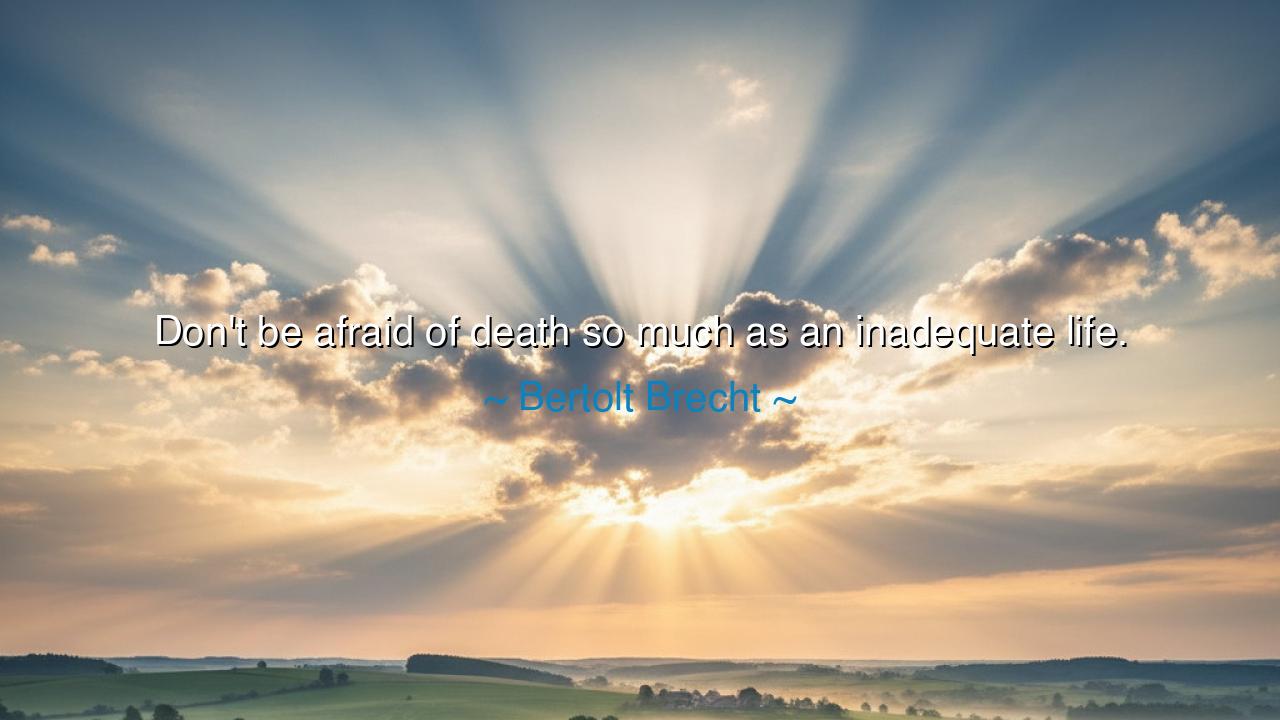
Don't be afraid of death so much as an inadequate life.






“Don’t be afraid of death so much as an inadequate life.” Thus wrote Bertolt Brecht, the poet and playwright who wrestled with the tumult and terror of the twentieth century. In this brief commandment, he speaks as both prophet and rebel — calling mankind not to fear the inevitable end, but to tremble instead before the thought of a life half-lived. His words burn like iron because they strike at the core of our frailty: that most men do not die too soon, but rather begin to live too late.
Brecht was no stranger to mortality or meaning. He lived through wars, exile, and the rise of tyranny; he saw his homeland crumble beneath the boots of ideology. Yet through all of it, he refused despair. He believed that the true tragedy was not death — for death claims all — but the waste of life, the surrender of the soul to fear, conformity, and comfort. To him, the inadequate life was the life unlived: a life without courage, without purpose, without the sacred fire of engagement with the world. Death may come but once, he said, yet the timid man dies a thousand small deaths before his body ever falls.
His words echo the wisdom of the ancients. The Stoics taught that to fear death is to fear nature itself, for it is as natural to die as to be born. Marcus Aurelius wrote, “It is not death that a man should fear, but never beginning to live.” Brecht, though centuries apart, carries the same torch — but he wields it with the urgency of one who has seen how modern man hides from life behind machines, institutions, and illusions. He reminds us that existence without meaning is no triumph over death; it is merely a slower defeat. To live well is to face life’s storms, to dare, to create, to love — even knowing that all will pass.
Consider the life of Socrates, the Athenian sage who drank the poison hemlock rather than renounce his pursuit of truth. The people condemned him to die, yet it was not he who was afraid. In his final hours, he spoke calmly of death as a journey to another place — but warned that the greater evil was to live falsely, to silence one’s conscience in order to survive. He chose a complete life over a long one, proving Brecht’s wisdom centuries before the words were spoken: that it is better to perish in truth than to endure in emptiness.
Brecht’s own art bore this conviction. His plays — raw, political, and piercing — sought to awaken the sleeping masses, to shake them from complacency. He did not write to entertain but to ignite awareness, to provoke the audience into action. For him, the artist’s task was not to comfort, but to confront — to demand that people live consciously, that they refuse the shallow security of obedience. In this, he lived what he taught: that to live inadequately is to betray the soul, while to live with courage is to achieve immortality, even in fleeting form.
The fear of death, Brecht knew, is the great chain that binds humanity. It drives men to seek safety at the expense of freedom, comfort instead of growth. Yet all the while, the years slip away — the dreams untended, the words unsaid, the love unspoken. Death does not need to strike the body; it can dwell in the spirit that has ceased to strive. The grave begins not in the earth, but in the heart that no longer dares. Thus Brecht calls us not to avoid death, but to outrun it in meaning — to fill the brief span of our days with such fullness that death finds us already fulfilled.
So let this teaching be a light for your own path: Do not measure life by its length, but by its depth. Do not count the years you live, but the truths you serve, the kindness you give, the courage you display. Fear not the final breath, but the wasted moment — the silence when you could have spoken, the hesitation when you could have acted, the apathy when you could have loved. For it is not death that ends us — it is the refusal to live greatly while we have breath.
Therefore, live boldly. Work, create, love, and seek truth with all the vigor your soul can muster. Let your life be adequate to the gift of being alive. And when death comes — as it must — let it find you not afraid, not regretful, but radiant and spent, your heart blazing with the knowledge that you have lived as one who truly lived. For as Brecht taught, the greatest defeat is not to die, but to live without ever truly being alive.






AAdministratorAdministrator
Welcome, honored guests. Please leave a comment, we will respond soon